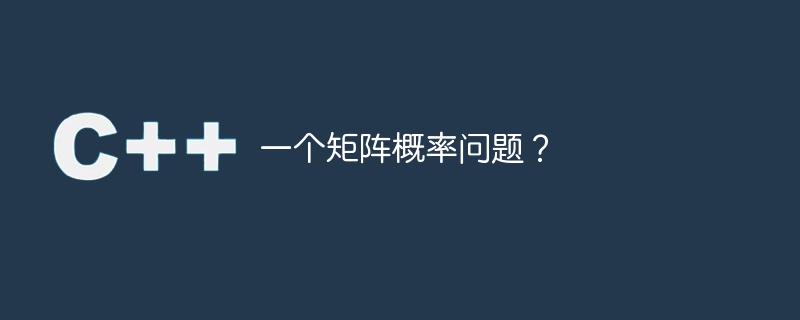Home >Backend Development >C++ >A matrix probability problem?
A matrix probability problem?
- WBOYWBOYWBOYWBOYWBOYWBOYWBOYWBOYWBOYWBOYWBOYWBOYWBforward
- 2023-08-28 20:37:061111browse

Here we will see a matrix probability problem. We have a rectangular matrix. We can move in four directions from the current cell with equal probability. The four directions are left, right, up, and down. We want to calculate the probability after N moves starting from position M[i,j].
Here we have to do some things related to DFS. We will recursively traverse the four possible rooms starting from the current room. Then we calculate the probability of taking one less step. Since the four directions have equal probabilities, each direction will contribute 0.25 of the total probability. We will return 0 if a matrix boundary is crossed and 1 when N moves are completed. Let's look at the algorithm to get this idea.
Algorithm
matProb(m, n, x, y, N)
Begin if x,y is not in matrix boundary m, n, then return 0 if N is 0 , then return 1 prob := 0 prob := prob + matProb(m, n, x-1, y, N-1) * 0.25 prob := prob + matProb(m, n, x+1, y, N-1) * 0.25 prob := prob + matProb(m, n, x, y+1, N-1) * 0.25 prob := prob + matProb(m, n, x, y-1, N-1) * 0.25 return prob End
Example
#include<iostream>
using namespace std;
bool isSafe(int x, int y, int m, int n) { //function to check whether (x,y)
is in matrix or not
if(x >= 0 && x < m && y >= 0 && y < n){
return true;
}
return false;
}
double matProb(int m, int n, int x, int y, int N) {
if (!isSafe(x, y, m, n)) //if coundary is crossed
return 0.0;
if (N == 0) //when N is 0, or N is completed, return 1
return 1.0;
double probability = 0.0;
probability += matProb(m, n, x - 1, y, N - 1) * 0.25; //move left
probability += matProb(m, n, x, y + 1, N - 1) * 0.25; //move up
probability += matProb(m, n, x + 1, y, N - 1) * 0.25; //move right
probability += matProb(m, n, x, y - 1, N - 1) * 0.25; //move down
return probability;
}
int main() {
int m = 7, n = 8;
int x = 1, y = 1;
int N = 4;
cout << "Matrix Probability is " << matProb(m, n, x, y, N);
}Output
Matrix Probability is 0.664062
The above is the detailed content of A matrix probability problem?. For more information, please follow other related articles on the PHP Chinese website!

